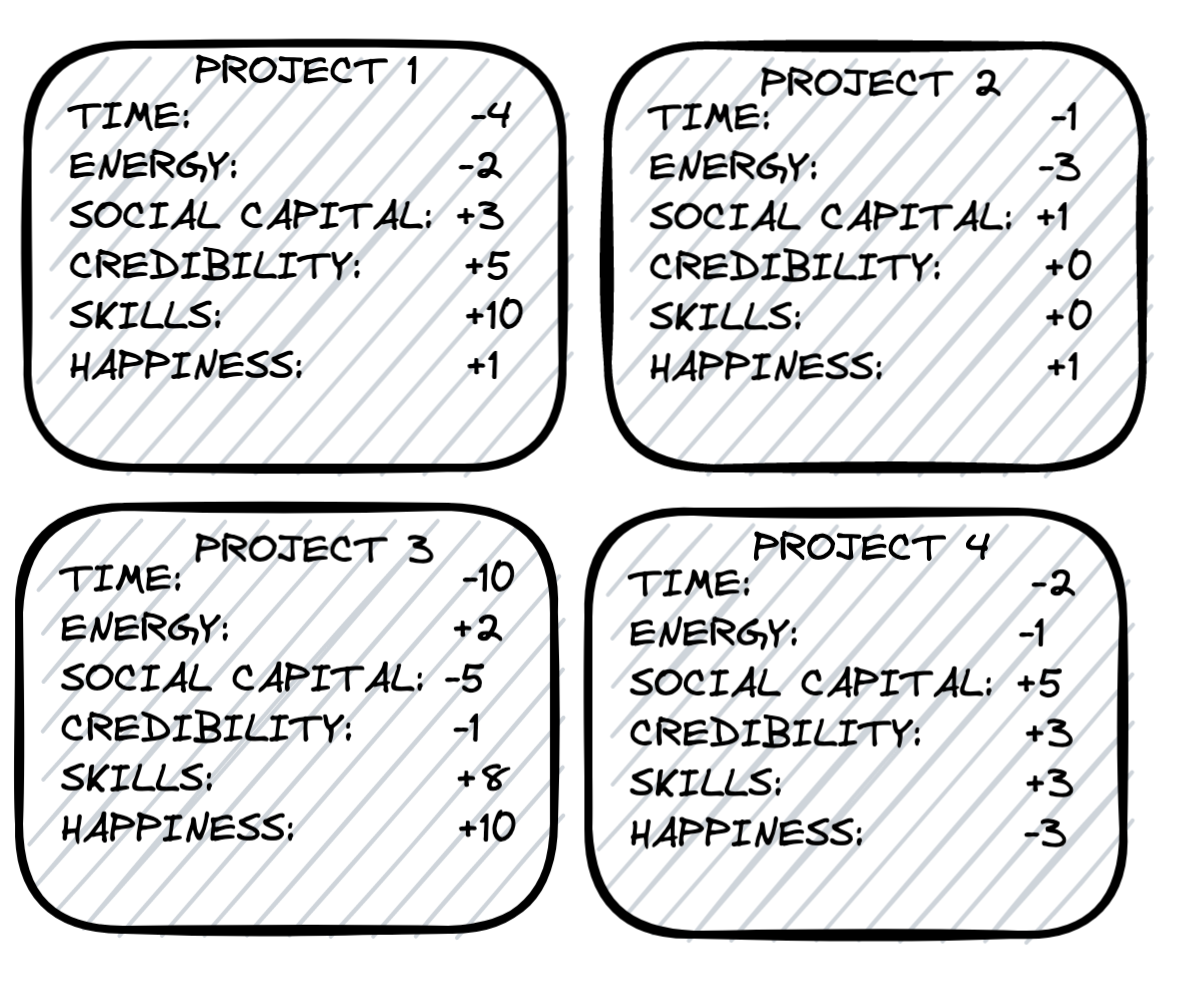There haven’t been a lot of community structures or resources for Staff+ engineers. That’s changing.
Read MoreHow many vacation days does it take to change a lightbulb?
I stopped using a todo list a while back. I put tasks into my calendar as meetings, then reschedule those meetings if I need to. Having all of the work already assigned a time slot (sometimes far in the future) means that when I have nothing scheduled, I don’t feel like I should be taking an item off the todo list: it’s genuinely free time.
I was surprised by the wave of emotion I felt when I deleted the giant todo list I’d been working from. I choked up a little. Whew. That thing had been hanging over me.
But when I started my vacation on Tuesday my mind was racing with things I wanted to do during my time off, so I brain-dumped it all into a doc. As I write this, I'm looking at this Google document, (it’s called "Tanya's vacation list"), and there are so many bullet points in that freaking document. I have a door frame I want to paint, two writing side quests I need to finish up, overdue email, some drainage work in the back yard, a ton of articles I’ve been meaning to read, clearing out the freezer, replacing my office chair. There’s an audio book I bought three months ago and never listened to. And it would be a good time to schedule a dentist appointment. And I should sort out the books I want to give away. And both of the lightbulbs in the hall are dead…
Ugh. I remember why I hated having a todo list.
Book update
I’m still working on Chapter 4 of the Staff Engineer’s Path. It’s currently called "Are You Starting Something?" (but that might change) and it’s about choosing which things to work on when there’s a vast universe of possible projects you could do–which there almost always is.
Whether it’s written down or not, the universe sure likes to provide a giant todo list of doom. And there’s this funny phenomenon where there’s so much important stuff to do that you end up not being able to choose, so you just pick up easy unimportant things instead. Hunter Walk calls this snacking, working on the low-effort, low-impact stuff because it’s there and it’s easy and there’s no big decision involved.
So I was thinking about what to write about that, and I realised I didn’t want to just talk about “do/drop/defer/delegate” and deciding which work is most important. Because, definitely, putting things in order and choosing high priority work is a good idea, but there’s more to it than that. Sometimes you’re trying to prove yourself, or show impact for a promotion, or build skills, or do something fun, or just rest your tired brain. Sometimes the objectively most important project is work that nobody else will value, or it’s something you’ve done a dozen times and won’t learn anything from, or it’s the kind of work that makes you tired even to think about it. There are times when snacking is actually the right decision, if you’re doing it deliberately.
So I found myself writing about what individuals need from a project.
What do you need?
I said once on Twitter that my key skill was making tortured analogies to classic video games so of course I drifted into thinking about how The Sims did this. Each Sim had a bunch of needs, modelled as a bar to fill up, and when one of them got low, you’d need to do something about it or the Sim would get cranky or stressed out or unhealthy. I wondered if we could think about work needs like that, except, instead of paying attention to your levels of hunger, comfort, social, and so on, you're keeping an eye on your time, energy, social capital, credibility, skills growth, and happiness. When your bar for one of those is filled up, you don’t need your next project to be good for that need. When one of them is dipping uncomfortably low, you might choose a project to help it. Some will make it better, others will make it much worse.
Is this the right list? I’m not sure! I’m going to write on it for a while more and see where it goes. My latest tortured video game analogy might evolve into something useful, or I may throw it out before Chapter 4 heads to early release later this month. We’ll see! In the meantime, if you'd like to read Chapters 1-3, they're here.
Deleting the task list. Again.
On Tuesday, I looked at my giant overwhelming task list of doom, couldn’t decide what was most important, and went out to Jamaica Bay wildlife refuge instead. Good call. It turns out that photographing snow geese was exactly what my low-energy pandemic-anxiety brain needed. Snow geese weren’t on my todo list, but ignoring the list and taking some unscheduled time was the right thing to do.
Lesson learned, again. I’ve just finished moving the list into my calendar–in some cases scheduled quite far in the future–and now I’m deleting the list again. My calendar says I’m going to change the lightbulbs today, and then the rest of the day is mine to do what I want with. Such an overachiever.
Whatever kinds of activities or projects you need right now, I hope you’re finding ways to get them. And if you’re anywhere near Jamaica Bay, I recommend a visit while the geese are still around.
I love Advent of Code
It’s the most wonderful time of the year!
Read MoreWrote some things!
Some recent writing: thinking of our future selves as stakeholders, leadership on the IC track, what a “real engineer” acts like, and the very exciting 97 Things Every SRE Should Know.
Read MoreTalks I like: Cultivating Architecture by Birgitta Boeckeler
Cultivating Architecture by Birgitta Boeckeler describes how to give teams autonomy without causing chaos.
Read MoreBeing Kind
in most situations, people being nice is unremarkable, just a reasonable default. Being kind though, that’s a game changer.
Read MoreProject time without focus time
Why learning Android dev has been the perfect pandemic hobby.
Read MoreMary Poppendieck on stage at O’Reilly Software Architecture NYC 2020
Conference Report: O'Reilly Software Architecture NYC 2020
I went to the O’Reilly Software Architecture Conference in NYC last week. I enjoyed it a lot but I was surprised by how little it overlapped with production/reliability conferences. Here’s my conference report.
Read MoreSurviving the Organisational Side Quest
The most frustrating but most useful work can be unblocking blocked projects. But it’s sometimes an epic adventure to understand why it’s blocked.
Read MoreTuning the distraction machine
I've been working on how to make my phone less of a distraction machine. Here’s some stuff I’ve found helpful.
Read MoreCan somebody volunteer to take notes?
The meeting is about to begin and the moderator asks "Can somebody take notes?". And then *nobody says a word*. Should you volunteer?
Read MoreNine takeaways from the DevOps report
I like the DevOps report because it brings us actual statistics on what’s making software engineering organisations successful. Here’s nine things I’m thinking about after reading this year’s report.
Read MoreYes if: My first post on the Squarespace engineering blog
I love when engineering groups share what they’ve learned, and Squarespace’s engineering blog was one of the things that drew me to the company. So I’m really excited to have my first blog post up there: The Power of “Yes, If”.
Read MoreLightning talk: Nobody could have predicted this
What can you tell from an RFC or design document about how a system will fail?
Read MoreConference Report: The Lead Developer NYC 2019
I went to The Lead Developer New York and I loved it.
Read MorePsychological safety leads to faster incident response. From Logan McDonald’s SRECon talk, “Optimizing for Learning”.
Conference Report: SRECon Americas 2019
SRECon Americas was in Brooklyn this year! SRECon has always emphasised the human side of reliability and I appreciated the focus on learning and teaching, psychological safety and avoiding burnout, as well as a bunch of tech topics around keeping sites running.
Read MoreWoman sitting on sofa with laptop. She’s refactoring and has spent the last hour composing a beautiful, intricate code structure in her head and it’s thiiis close to snapping together in an elegant and satisfying way. Image: unsplash.
Working from sofa
Can other people do focused work from desks? I’ve never gotten the hang of it.
Read MoreSix delicious macarons.
Image: Baher Khairy on Unsplash, cropped by the Unsplash add-on in Google slides.
Google Slides has an Unsplash integration!
Google Slides and I have spent a lot of time together, but our relationship is challenged every time I work with images. Until now!
Read MoreFireworks. Happy New Year!
Three things that went well in 2018
This isn't a full 2018 retrospective, but I wanted to write about three things I'm happy about from the year, all of which involved doing stuff that scared me.
Read More"I wouldn't start from here". How to make a big technical change.
So much of the time, we have a vision for where we’d like our technology to be, but it sure would be nice to not start from where we are. Whether we’re adding support for IPv6, deprecating Nagios, introducing a DevOps culture or moving to microservices, we’ve got the same problem ahead of us: how can we make enough people care?
Read More









